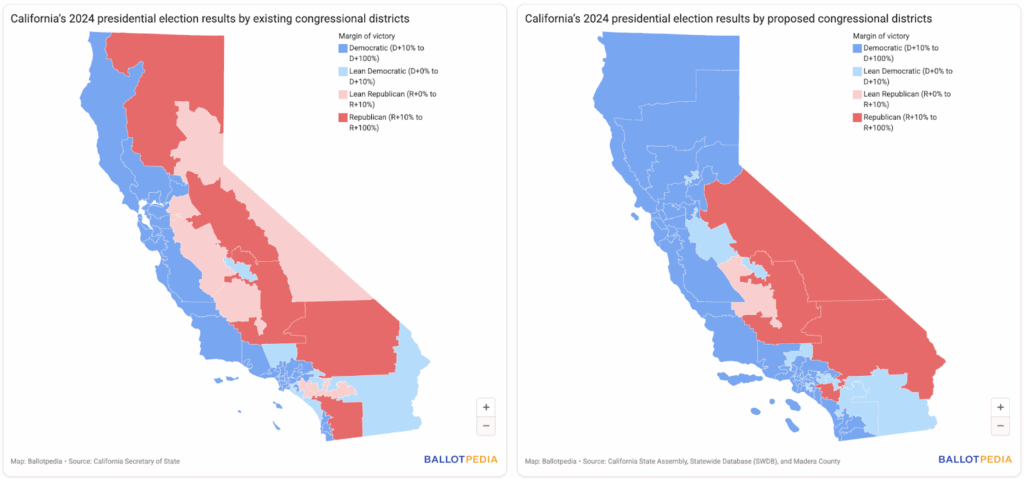California Proposition 50 would shift five Republican-held congressional districts toward Democrats based on presidential election results
On Nov. 4, California voters will decide on Proposition 50, which would approve a new, Legislature-drawn congressional map until the state's Citizens Redistricting Commission (CCRC) redraws it in 2031. Today, we'll look at the partisan lean for each proposed district, based on precinct results from the 2024 presidential election.
California's U.S. House delegation currently has 43 Democrats and nine Republicans.
In 2024, Kamala Harris (D) won California in the presidential election. She won 41 congressional districts, and Donald Trump (R) won 11. Under the proposed map, Harris would have won 47, and Trump would have won five.
This represents a net gain of six districts for Democrats based on presidential election results, or four above the current number (43) that Democrats represent.

Most states allow teenagers to pre-register to vote before turning 18, and some let them vote in primaries
While the minimum voting age in the United States is 18, every state with voter registration allows teenagers to pre-register to vote before they blow out the candles on their 18th birthday. North Dakota is the only state that does not have voter registration.
Pre-registration is a procedure in which people younger than 18 can fill out an application to register to vote. According to the National Conference of State Legislatures, pre-registrants are typically added to their state’s voter registration list, with a “pending” or “preregistration” status. This designation is removed when the pre-registrant turns 18 and is eligible to vote.
The age at which individuals can pre-register varies from state to state:
- Twenty states allow anyone who will be 18 years of age at the time of the next election to pre-register
- Ten states allow at least some 17-year-olds to pre-register
- Eighteen states and the District of Columbia allow 16-year-olds to pre-register
- Colorado allows 15-year-olds to pre-register
Michael Waltz confirmed as U.S. ambassador to the United Nations
On Sept. 19, the U.S. Senate voted 47-43 to confirm the final member of President Donald Trump's (R) second-term cabinet: Michael Waltz as U.S. ambassador to the United Nations. Forty-four Republicans and three Democrats, Sens. John Fetterman (D-Pa.), Mark Kelly (D-Ariz.), and Jeanne Shaheen (D-N.H.), voted in favor. Forty-one Democrats voted against the nomination, as did Sen. Angus King (I-Maine), and Republican Sen. Rand Paul (R-Ky.).
Trump announced Waltz’s nomination on May 1. Waltz was his second nominee for the position, following Trump’s initial nomination of Rep. Elise Stefanik (R-N.Y.) in November 2024. Trump withdrew Stefanik’s nomination in March 2025.
2026 could have the most Senators run again after leaving office since 2012 and 2014
On Sept. 3, former U.S. Senator John E. Sununu (R-N.H.) told WMUR TV that he is considering entering the 2026 U.S. Senate race in New Hampshire. If Sununu runs, he would be the second former Senator to announce a bid for the seat. Former U.S. Sen. Scott Brown (R), who previously represented Massachusetts, announced his campaign in June. Incumbent Jeanne Shaheen (D), who defeated Sununu in 2008, is retiring.
If Sununu enters, these two wouldn’t be the only Senators running for Senate again, as former Ohio Senator Sherrod Brown (D) is running after he lost to Bernie Moreno (R) in 2024. Additionally, 2026 would have the most former Senators running since 2012 and 2014, when three former Senators ran.


